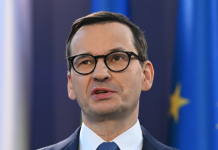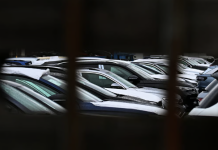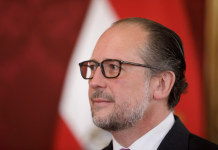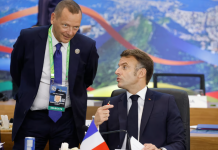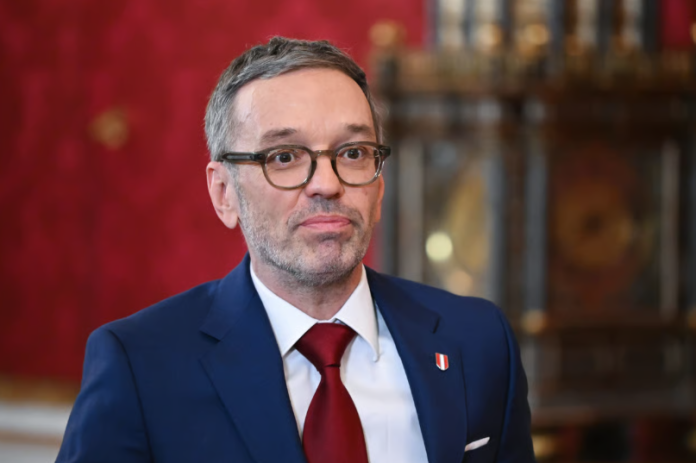
Vienna could be about to get its first far-right leader since World War II. Europe’s mainstream sees trouble brewing.
Europe’s next national leader looks likely to come from the far right.
With Herbert Kickl in pole position to become chancellor of Austria, the European Union’s establishment is bracing for fresh torment ― and another punch in the guts in its stand against Russia’s Vladimir Putin.
Kickl, who would become Austria’s first far-right leader since World War II, has made no secret of admiring Hungarian Prime Minister Viktor Orbán and is likely to follow a similar playbook: cozying up to the Kremlin, clashing with the EU mainstream, and pursuing hardline policies in areas like migration.
If his Freedom Party (FPÖ) takes charge, it would mean a swathe of the EU, from Hungary through Austria to Slovakia under outspoken Prime Minister Robert Fico ― and potentially to the Czech Republic, where former Prime Minister Andrej Babiš is leading in polls ahead of an election in October ― would be sympathetic toward Russia three years into Putin’s full-scale invasion of Ukraine.
It also brings back disturbing memories for Brussels, which in 2000 saw the FPÖ under one of Kickl’s predecessors, Jörg Haider, become part of Austria’s governing coalition. At the time, other governments within the EU broke off bilateral contacts with Vienna.
Should he become chancellor, Kickl goes one better than Haider. On Tuesday he fired the starting gun on coalition talks with the center-right Austrian People’s Party (ÖVP) following the breakdown of negotiations among mainstream parties.
‘Third world war’
The similarities between Kickl and Orbán, whom he has called a “role model,” are striking. Just like Orbán, the FPÖ is banking on Russian gas, is highly critical of sanctions against Russia, and wants to cut aid to Ukraine.
What’s worrying for the EU, especially in areas where agreement among all 27 governments is needed, is that the duo would likely work together to block major initiatives. Orbán has been an irritant to Brussels for years, but while he has ultimately often bowed to political pressure ― such as on EU enlargement just over a year ago ― Hungary and Austria combined could be a force to be reckoned with.
It’s not hard to imagine that the first victim could be Ukraine.
“The European Union is currently pursuing a course of escalation at every turn, which could end in a third world war,” Kickl’s party program reads.
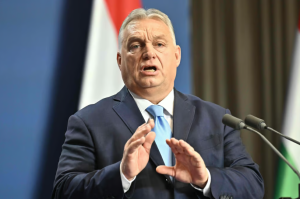
Sanctions on Russia make the EU “partly to blame” for the “suffering and death in Ukraine and Russia” and only fuel further conflict, according to Harald Vilimsky, the FPÖ’s lead candidate for the EU election and a member of the European Parliament.
Kickl’s party echoes U.S. President-elect Donald Trump in saying the EU should embrace a “peace policy” to force Ukraine to the negotiation table. The party has pledged to block any aid to Ukraine though the European Peace Facility ― a pot of cash for security.
In 2016 the party even signed a “friendship agreement” with Putin’s United Russia party in which the two sides agreed to exchange information and to hold regular joint consultations.
Echoes of the Nazi period
While Kickl stressed after Russia’s February 2022 invasion of Ukraine that this friendship agreement has since expired, the party still holds a favorable view of Russia. Visits by Orbán and Fico to Moscow were described as “real peace diplomacy” by the Austrian far right.
Kickl, who proclaimed himself the people’s chancellor, or Volkskanzler, during the 2024 election campaign ― the term came to prominence when the Nazis seized power in Germany in 1933 ― is also eyeing a complete revamp of Austria’s asylum system.
He has vowed to preserve the “homogeneity” of the Austrian people by suspending the right of asylum though an “emergency law,” and by pushing for the “consistent remigration” of asylum seekers. This would be a clear violation of EU law.
The party’s program advocates the placement of European migration centers in third countries for “millions of people,” and the halting of payments to the EU if the bloc doesn’t keep its promise to “protect” its external borders.
The FPÖ is also aiming to unravel the European Green Deal, a set of EU policies aimed at making the bloc carbon neutral, which it deems one of the major causes of Europe’s lack of competitiveness. “The corset of EU regulations must be broken,” the party program reads.
Precedent for Germany
In Germany, the far-right Alternative for Germany (AfD), polling second in the runup to February’s election, is celebrating.
While the AfD and FPÖ don’t sit in the same pan-European group in the European Parliament, they are closely aligned, fueling fears in Berlin that Austria could set a precedent for Europe’s largest economy and closest neighbor.
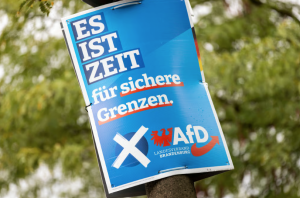
Kickl’s appointment to form a government has been criticized across the political spectrum in Germany.
“A look at Austria shows what happens when you are no longer able to form an alliance,” German Economy Minister Robert Habeck of the Greens told Deutschlandfunk public radio.
On the other hand, Alice Weidel, co-leader of the AfD, has called on the German center right to tear down the cordon sanitaire and consider entering a coalition government, a plea the conservatives have so far steadfastly refused.

